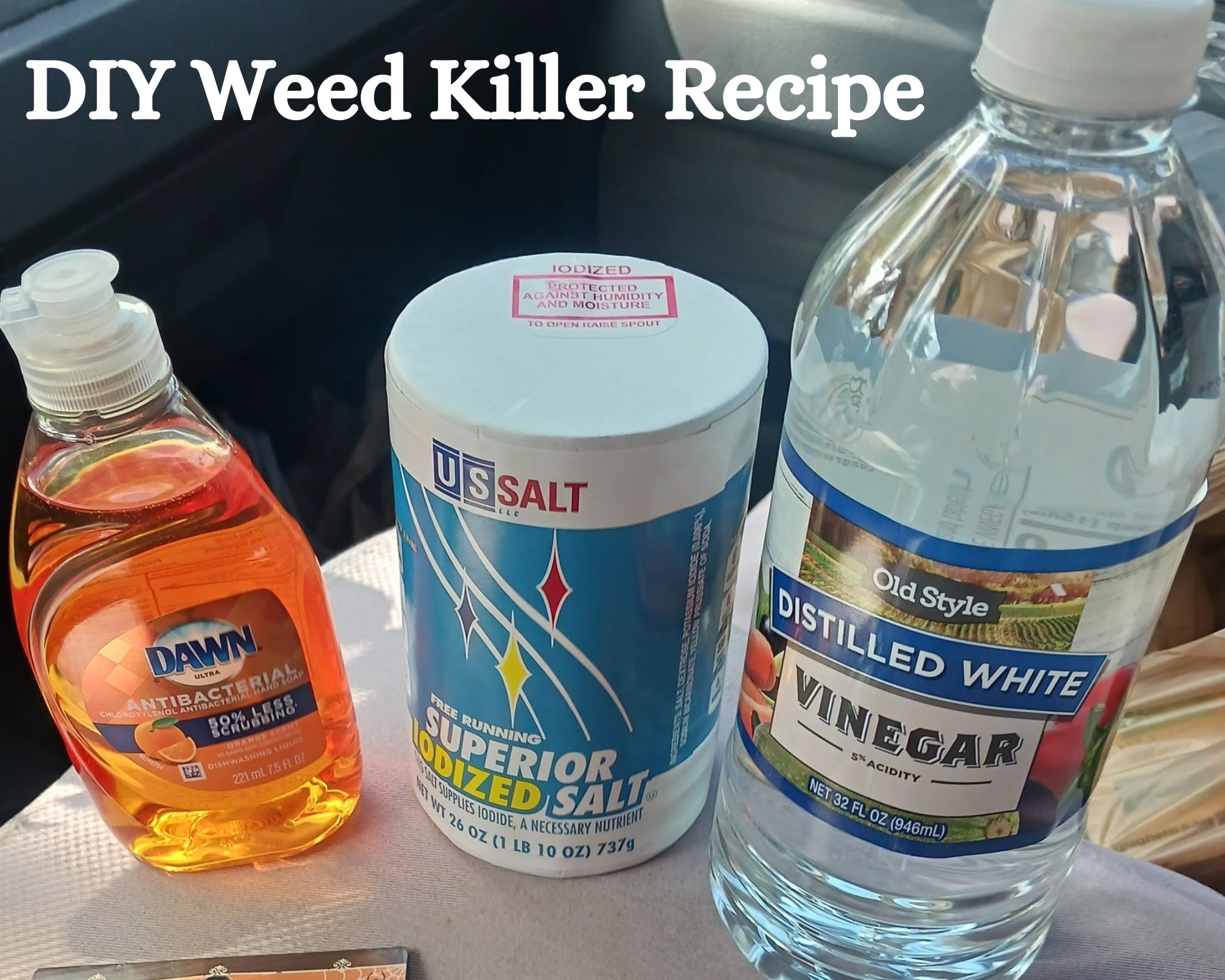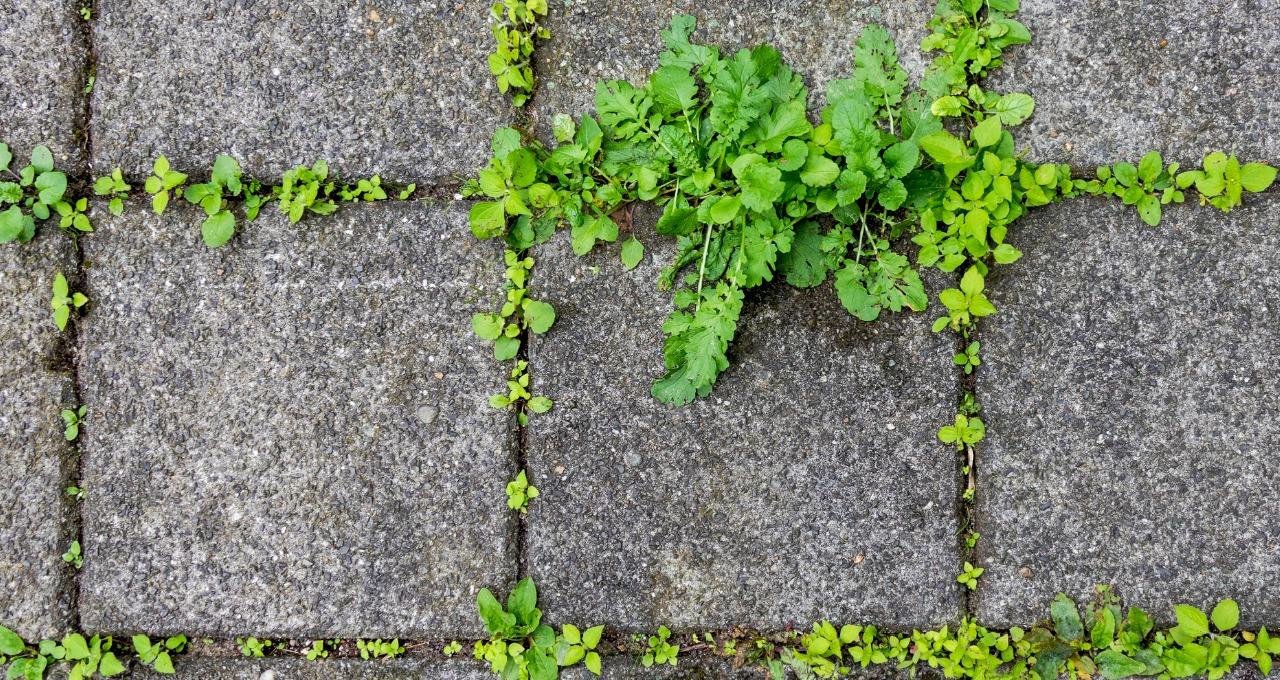The solution to the weeds that have taken over your driveway, sidewalk, and patio could be right before you. Say goodbye to chemical-laden commercial weed killers and embrace the more eco-friendly solution made with white vinegar, dawn soap, and regular salt.
This DIY weed killer is effective, safe, economical, and easy to make and use. It is a fantastic alternative to store-bought herbicides that will help you reclaim your outdoor spaces from unwanted vegetation without costing you much.
Grab these items and join me in making this weed killer below.
Easy Steps To Making A safe Weed Killer
Ingredients
Instructions
1. Mix The Ingredients
First, put on gloves and eye protection to protect your skin and eyes from the risk of irritation or chemical burns when preparing and using this weed killer.
Combine 1 gallon of white vinegar with 1 cup of Dawn dish soap in a large container, then thoroughly but gently stir the mixture to incorporate the soap into the vinegar. After that, add 1 cup of regular salt to the vinegar and soap solution, then stir the solution again to dissolve the salt.
2. Transfer The Solution To A Sprayer
You have two options here- a garden sprayer or a spray bottle. Carefully pour the solution into your chosen sprayer.
Ensure the sprayer has a nozzle to facilitate targeted application and that it is clean to avoid clogging during application. A spray bottle will do if there are just a few weeds in your driveway, sidewalk, and patio. On the other hand, opt for a garden sprayer if you have a lot of weeds to kill.
3. Kill The Weeds
To successfully eradicate the weeds in your walkway, sidewalk, or patio, including those growing in cracks and crevices, you must ensure the solution coats the leaves of the weeds.
Hold the sprayer at a comfortable distance from the weeds, typically 6 to 12 inches (15 to 30 centimeters) away. Then, direct the sprayer’s nozzle toward the weeds, making sure the solution thoroughly covers both the stems and leaves.
Spray the solution liberally but avoid excessive runoff onto surrounding areas or desirable plants.
Note
The best time to apply this treatment is on a sunny, dry day when there’s no rain expected for a minimum of 24 hours. The day should also be calm (no wind) to reduce the prospect of drift. Moreover, avoid the hottest part of the day to prevent rapid evaporation. Instead, do this in the morning or evening.
4. Wait and Repeat
You might need to apply this treatment multiple times to kill the weeds completely. Let the weed-killer solution sit on the weeds for at least 24 hours without watering or disturbing them. You will see the foliage of most tender weeds wilting and browning. Tougher weeds may remain standing, requiring reapplication to kill them.
If you can still see live weeds after 2 to 3 days, reapply the solution, then continue monitoring the area until they all die.
Read More:
Other Natural Ways Of Getting Rid Of Weeds In Driveways, Sidewalks, And Patios
Below are other natural ways that effectively kill weeds in driveways, patios, and sidewalks.
a) Boiling Water
Boiling water scalds the weeds and destroys their cell structure. Gently pour boiling water on the weeds, but make sure the water doesn’t splash onto surrounding vegetation.
b) Manual Removal
Pulling or digging out weeds is among the oldest and most reliable methods of controlling weeds. Consider this approach when handling a few unwanted plants or if using chemicals or machinery is impractical or undesirable.
Manually remove weeds when they’re young and small. Since this method can be physically demanding, take breaks to prevent fatigue and strain, especially when working on larger areas or tough weeds.
Furthermore, remove the weeds when the soil is moist but not overly wet. Weeding during drought or extreme heat is a bad idea because these conditions will put you and your plants through undue stress.
c) Mulching
Evenly spread 2-4 inches of organic mulch or 1-2 inches of inorganic mulch over the soil surface using a rake or shovel to create a barrier that inhibits weed growth. Mulch also blocks sunlight, thus barring weed seeds from germinating.
When applying mulch, leave some inches between the mulch and the stems or trunks of plants to prevent rot and fungal diseases. Use organic mulch if you want to suppress weeds while also enriching the soil and improving its structure.
In contrast, choose inorganic mulch in places where you want to create a permanent weed barrier.
d) Corn Gluten Meal
Apply this natural pre-emergent herbicide in spring or fall before the weed seeds germinate to keep them from sprouting and establishing roots. Since this product primarily targets broadleaf weeds and does not affect grasses, it’s handy for controlling weeds in lawns and turfgrass areas.
Besides suppressing weeds, corn gluten meal adds nitrogen to the soil, aiding the growth of healthier plants. However, avoid overapplication because excessive nitrogen can promote excessive grass growth or contribute to nutrient runoff.
e) Weed Torch
Weeds can tolerate some heat but not the 2000 °C from a weed torch flame. Use a weed torch to kill the weeds growing in the cracks in your hard surfaces like your patio, driveway, or sidewalk. With this method, you can target weeds without harming desirable vegetation.
Before using a weed torch, remove any flammable materials, debris, or obstructions, and wear closed-toe shoes, long pants, gloves, and safety goggles. Also, keep a fire extinguisher or water source nearby and pick a calm day to torch weeds to prevent flames from spreading and causing unintended fires.
Summary
Eco-friendliness, ease of formulation and application, cost-effectiveness, safety, versatility, and rapid results. These are the benefits of making and using a weed killer with white vinegar, salt, and dawn soap. With this potent concoction, you have complete control of what you spray on your driveway, patio, and sidewalk. This treatment targets weeds at their roots, ensuring they don’t resurface anytime soon.

Hey there, I’m Derek Schew, a writer for Lawnholic.com, where we cover everything and anything related to lawns. As someone who’s spent countless hours tending to my own lawn, I’m passionate about sharing my knowledge and helping others achieve the perfect yard. From lawn care tips to product reviews, I’m committed to providing our readers with the most accurate and up-to-date information available. So whether you’re a seasoned lawn enthusiast or just getting started, I invite you to join our community and discover the joys of a lush, green lawn.


